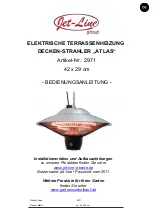
15
heater industry. Hardness expressed as mg/L or ppm may be divided by 17.1 to convert to grains per
gallon. Water may be classified as very soft, slightly hard, moderately hard, or hard based on its hardness
number. The minerals in the water precipitate out when the water is heated and cause accelerated lime
and scale accumulation on a heat transfer surface.
If the hardness of the water exceeds the maximum level of 7 grains per gallon, water should be softened
to a hardness level no lower than 5 grains per gallon. Water softened as low as 0 to 1 grain per gallon
may be under-saturated with respect to calcium carbonate, resulting in water that is aggressive and
corrosive.
pH of Water
pH is a measure of relative acidity, neutrality or alkalinity. Dissolved minerals and gases affect water pH.
The pH scale ranges from 0 to 14. Water with a pH of 7.0 is considered neutral. Water with a pH lower
than 7 is considered acidic. Water pH higher than 7 is considered alkaline. A neutral pH (around 7) is
desirable for most potable water applications.
Corrosion damage and heater failures resulting from
water pH levels of lower than 6 or higher than 8 ARE NOT covered by the warranty.
The ideal pH
range for water used in a storage tank or a water heater system is 7.2 to 7.8.
Total Dissolved Solids
Total Dissolved Solids (TDS) is a measurement of all minerals and solids dissolved in a water sample.
The concentration of total dissolved solids is usually expressed in parts per million (ppm).
Water with a high TDS concentration will greatly accelerate lime and scale formation in the hot water
system. Most high TDS concentrations precipitate out of the water when heated. This can generate a
scale accumulation on the heat transfer surface that will greatly reduce the service life of a water heater.
This scale accumulation can also impede the ability of the heat exchanger to transfer heat into the water.
A heat exchanger damaged or blocked by lime/scale accumulation must be replaced.
The manufacturer of the water heater has no control of water quality, especially TDS levels in your
system. Total dissolved solids in excess of 2,000 ppm will accelerate lime and scale formation in the heat
exchanger. Heat exchanger failure due to total dissolved solids in excess of 2,000 ppm is a non-
warrantable condition.
Failure of a water heater due to lime scale build up on the heating surface IS
NOT covered by the warranty.
Hardness:
7 grains
Chloride levels:
100
pH levels:
6-8
TDS:
2000
PART 4: DOMESTIC WATER PIPING
A. TEMPERATURE AND PRESSURE RELIEF VALVE FOR DHW
Install a temperature and pressure relief valve into the marked port (upper right). We recommend a
WATTS 40XL5 valve or equivalent for 130,000 BTU models or above input. The valve must meet the
ANSI Z21.22B requirements for relief valves for hot water heaters as per a nationally recognized lab that
maintains a periodic inspection of production of such listed safety device. The pressure rating of the valve
must not exceed the listed working pressure of this appliance, and must be rated to the proper BTU/hr
capacity of the water heater.
Содержание Versa Hydro PHE130-119
Страница 23: ...23 Figure 5 Figure 6 ...
Страница 24: ...24 Figure 7 ...
Страница 25: ...25 F HYDRONIC PIPING Figure 8 ...
Страница 26: ...26 Figure 9 ...
Страница 27: ...27 Figure 10 ...
Страница 28: ...28 Figure 11 ...
Страница 29: ...29 Figure 12 ...
Страница 32: ...32 F INTERNAL WIRING Figure 14 Internal connection diagram ...
Страница 38: ...38 Figure 17 ...
Страница 48: ...48 Figure 25 ...
Страница 76: ...76 Figure 29 ...
Страница 77: ...77 Figure 30 ...
Страница 78: ...78 Figure 31 LP 314 G ...
Страница 79: ...79 Figure 32 ...
Страница 81: ...81 ...
Страница 82: ...82 ...
Страница 83: ...83 MAINTENANCE NOTES ...
















































